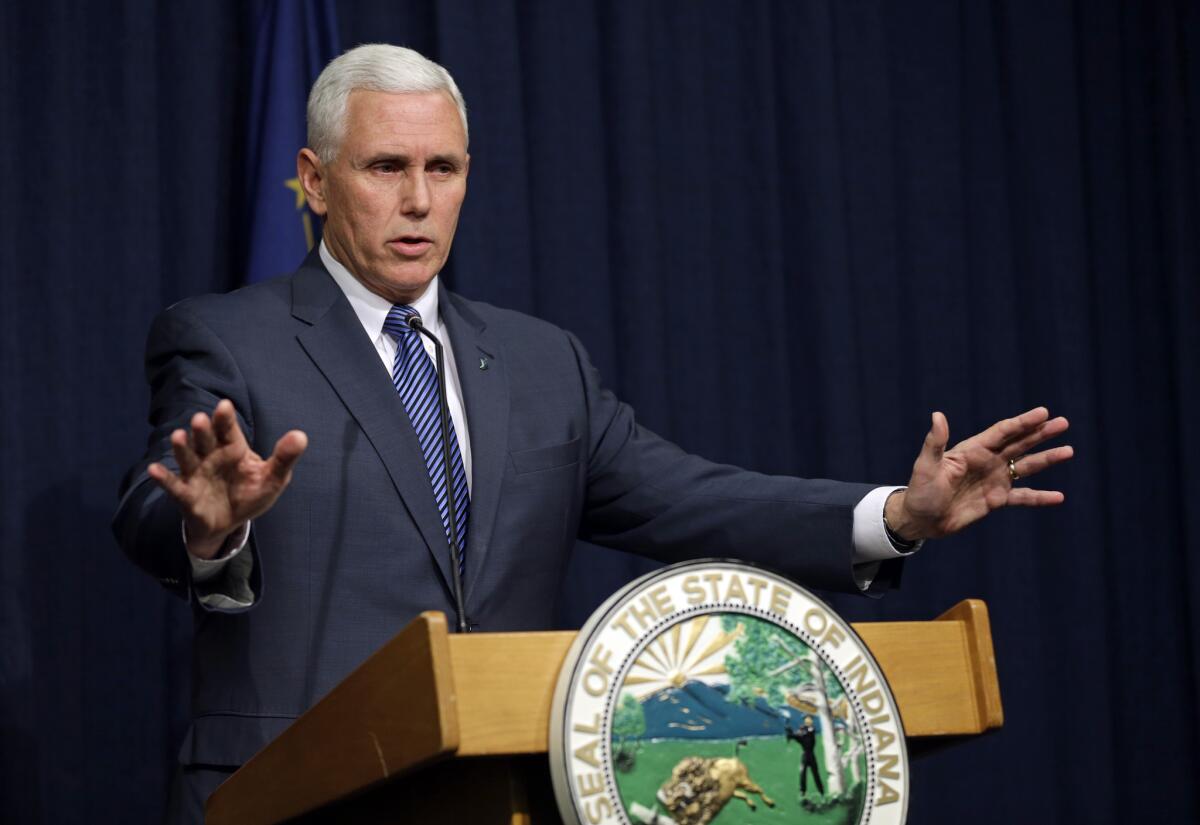Column: Where do ‘religious freedom’ acts mention gays or lesbians?

Poor Mike Pence. The Indiana governor, eyeing a long-shot presidential bid, probably didn’t expect the hot mess he got himself into by signing his state’s version of the federal Religious Freedom and Restoration Act, or RFRA. And it showed.
On ABC’s “This Week,” Pence was grilled by George Stephanopoulos about the law. “Yes or no question, Governor,” Stephanopoulos pressed. “Do you think it should be legal in the state of Indiana to discriminate against gays or lesbians?”
The usually quick-witted Pence was flustered. “George, you’re — you’re following the mantra of the last week online [media coverage]. And you’re trying to make this issue about something else.”
Well, yeah. But Pence really has no excuse for being ill-prepared. Arizona Gov. Jan Brewer went through a similar brouhaha last year, and opted to cave to the anathematizing fury of the elite mob. In both states, the national media and most of the Democratic Party insisted that RFRA laws are “anti-gay” even though they make no mention of sexual orientation.
The federal RFRA was passed in 1993, in response to a Supreme Court decision holding that Native Americans weren’t exempt from anti-drug laws barring the use of peyote, even for religious ceremonies.
In response, Congress passed a law saying that the government couldn’t put a burden on religious practice without a compelling state interest. If someone feels their religious rights have been violated, they can go to court and make their case. But there is no blanket exception for religions. If a synagogue sued because it wanted to be exempt from, say, local fire codes, it would almost certainly lose. If it sued because of a ban on the use of ceremonial wine, it would probably win.
The original RFRA was a good and just law that had absolutely nothing to do with gays. It was introduced in the House by then-Rep. — and now reportedly the next Senate minority leader — Charles E. Schumer (D-N.Y.). It passed on a voice vote in the House and by 97 to 3 in the Senate. President Clinton signed it into law without controversy.
In 1997, the high court weighed in again, ruling that RFRA was too broad and could not be applied to states. So, various state governments passed their own versions. Twenty states have close to the same version as the federal government’s, and a dozen more have similar rules in their constitutions. These states include such homophobic hotbeds as Connecticut, Massachusetts and Illinois, where, as a state senator, Barack Obama voted in favor of the law.
“This big gay freak-out is purely notional,” according to legal writer Gabriel Malor (who is gay). “No RFRA has ever been used successfully to defend anti-gay discrimination, not in 20 years of RFRAs nationwide.”
These facts didn’t keep the White House from encouraging the auto-da-fé of Pence and the Hoosier state. Press Secretary Josh Earnest responded to Pence on “This Week”: “When you have a law like this one in Indiana that seems to legitimize discrimination, it’s important for everybody to stand up and speak out.” He added, “If you have to go back two decades to justify something that you’re doing today, it may raise some questions about what you’re doing.” This is an odd argument from people keen on comparing Obama initiatives to the New Deal
It’s all the more ironic given that opponents of Indiana’s RFRA glibly equate it to Jim Crow laws. Those were evil codes that forced businesses and religious institutions, including ones that did not want to discriminate, to refuse equal service to blacks. A closer, but far from perfect, parallel to Jim Crow would be the Obama administration’s efforts to force Hobby Lobby and nuns to pay for for contraceptive coverage or drugs that some believe cause abortion, in defiance of RFRA.
Indiana’s RFRA is, in fact, slightly different from others — in that it would more obviously give a hypothetical baker, photographer or florist a day in court if sued for refusing to participate in a same-sex wedding ceremony. Such exemptions, if successful, would at worst amount to a meager consolation prize to opponents of same-sex marriage, who have lost that battle already.
Pence would have done himself a favor if he had honestly admitted he favors such accommodations, since most Americans favor them as well.
[email protected]
Follow the Opinion section on Twitter @latimesopinion and Facebook
More to Read
Sign up for Essential California
The most important California stories and recommendations in your inbox every morning.
You may occasionally receive promotional content from the Los Angeles Times.











